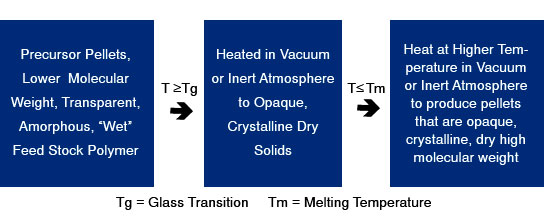Solid State Polymerization
Solid State Polymerization (SSP) is a process in which the
polymer chain lengths are increased by heat in the absence of oxygen
and water, by means of either vacuum or purging with an inert gas to
drive off the by-products of reactions. The reaction is driven by
temperature, pressure, and the diffusion of by-products from the
interior of the pellet to the surface. SSP is an important step
frequently used after melt-polymerization for the purpose of
enhancing the mechanical and rheological properties of polymers
before injection blow molding or extruding. The SSP technique is
widely applied in industrial manufacture of bottle-grade PET, films,
and superior industrial fibers.
How the Process Works
- PPLLC receives PET, polyesters or other condensation polymers
made by melt polymerization
- PPLLC transfers the pellets to a Rotary
Vacuum Dryer (RVD)
- Generally, the vacuum pump removes air, water and
by-products of the SSP; alternatively, nitrogen purging is used
- The
temperature/time profile is controlled with a microprocessor
- Initial
heating at a temperature above Tg cold crystallizes amorphous
pellets to prevent sticking and fusion of pellets
- Heating is
continued to dry the ”wet” pellets
- Heating is continued to a
predetermined temperature below the melting temperature of the
polymer
- Solid state polymerization is done at a high temperature and
low vacuum (or alternatively at zero oxygen level with nitrogen
purging) to achieve the desired high molecular weight of the polymer
- The SSP progress is followed by periodically taking samples with
custom designed samplers
- The melt viscosity at a specific
temperature of that sample is determined within several minutes
- The
Intrinsic Viscosity is obtained from the Correlation Chart/Curve
established from melt viscosity data and Intrinsic Viscosity
obtained from solution viscosity at ambient temperatures for PET homopolymers
- The final product viscosity is as specified by the
customer
- A major benefit of solid state polymerization is obtaining
a desired high molecular weight polymer of uniform and consistent
Intrinsic Viscosity
- Other major benefits include the reduction of
undesirable side reactions and the levels of by-products
- For PET,
the SSP by-products are ethylene glycol and acetaldehyde
- When the
desired molecular weight is achieved, the product pellets are cooled
and transferred to storage tanks
- The product pellets are classified,
packaged and shipped according to customer requirements


PPLLC is a leading
thermoplastic solutions provider
PPLLC provides recycling solutions for post consumer and post industrial
resins, including PET. Single screw extrusion technology is used to melt,
process, and filter recycled flake into pellets. PPLLC's capabilities
include drying, extruding, and underwater pelletizing flake to provide a
pellet feedstock for further processing. PPLLC routinely increases the IV
of recycled polyesters and nylons for specialty applications.